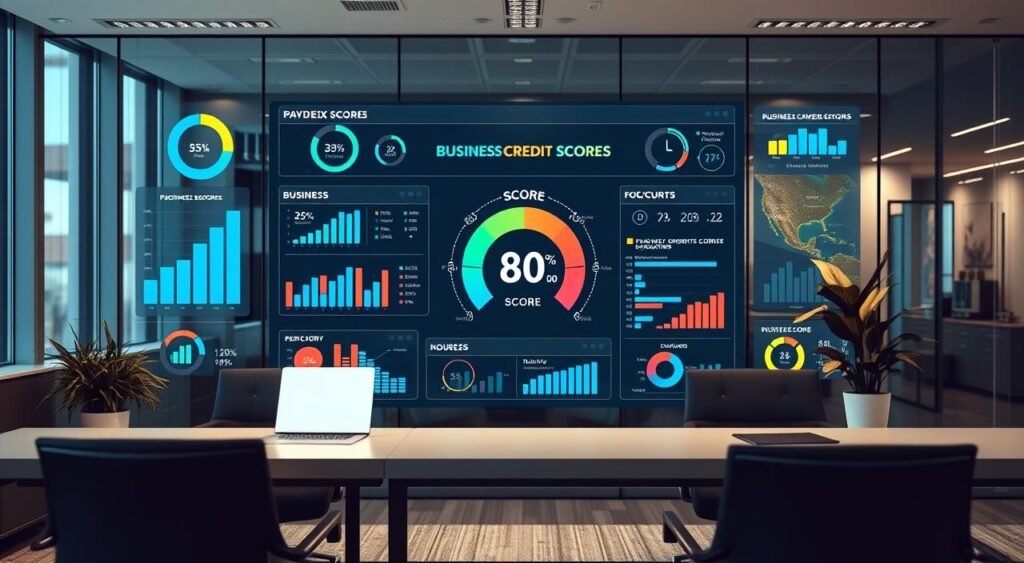Did you know that the FICO Small Business Scoring Service (FICO SBSS) uses a credit score scale of 0 to 300 for businesses1? This startling statistic highlights the importance of building strong business credit, as it can open the doors to financing and investment opportunities that your company may need to grow and succeed. As a small business owner, establishing good business credit is crucial – and the earlier you start, the better.
Business credit is not the same as your personal credit score and history. It’s a separate profile that measures your company’s creditworthiness based on factors like payment history, revenue, and debt1. By separating your personal and business credit, you can help your company establish its own identity and credit profile, making it more likely to be approved for business loans and other financing1.
In this beginner’s guide, you’ll learn the key steps to building and maintaining strong business credit, from registering your business to monitoring your credit reports. Whether you’re just starting out or looking to improve your company’s financial standing, understanding the importance of business credit is essential for your long-term success.
Key Takeaways
- Establishing business credit is crucial for small businesses to access financing and investment opportunities.
- Business credit is separate from personal credit, and building a strong business credit profile is a process that takes time.
- Factors like payment history, revenue, and debt utilization are key to building good business credit.
- Registering your business and obtaining a DUNS number are important first steps in establishing business credit.
- Monitoring your business credit reports and scores through agencies like Dun & Bradstreet, Equifax, and Experian is essential for maintaining and improving your credit profile.
Importance of Building Business Credit
Establishing a strong business credit score is crucial for any entrepreneur seeking to secure their company’s financial future. Business credit measures a company’s ability to access capital, build vendor relationships, and demonstrate financial strength to potential lenders and partners2. By prioritizing the development of robust business credit, you can unlock a range of benefits that will propel your venture towards long-term success.
One of the primary advantages of a well-established business credit profile is the ability to access capital on favorable terms2. In fact2, 20% of small business loans are denied due to poor business credit, underscoring the importance of proactively building and maintaining a strong credit history. With a solid business credit score, you can secure financing at competitive rates, empowering your company to seize growth opportunities and weather economic turbulence.
Furthermore, a robust business credit score can significantly enhance your vendor relationships2. Suppliers and partners are more inclined to extend favorable payment terms and credit limits to businesses with a proven track record of creditworthiness. This, in turn, can dramatically improve your cash flow and financial flexibility, allowing you to focus on core business activities rather than juggling immediate liquidity concerns.
Ultimately, the importance of building business credit cannot be overstated23. By prioritizing the development of a strong corporate finance profile, you can position your company for long-term success, unlock access to capital, strengthen vendor relationships, and enhance your overall financial strength. Investing the time and effort into building business credit is a strategic move that will pay dividends for years to come.
“A strong business credit score can open doors to new opportunities and provide a solid foundation for long-term growth.”
Understanding Business Credit Scores
As a business owner, it’s crucial to understand the importance of your company’s credit score. Unlike personal credit scores, which range from 300 to 850, business credit scores operate on a different scale. Dun & Bradstreet, one of the leading credit reporting agencies, ranks businesses on a scale of 0 to 100, while the FICO Small Business Scoring Service (FICO SBSS) uses a scale of 0 to 3004.
Your business credit score is determined by several factors, including your payment history, the age of your credit history, your debt levels, industry risk, company size, and other financial factors4. Unlike personal credit scores, which are private, business credit scores can be accessed by anyone, making them an important tool for lenders and potential business partners to assess your creditworthiness4.
To establish and maintain a strong business credit score, it’s essential to pay bills on time, use credit responsibly, and monitor your score for any changes. Keeping your credit utilization below 30% can also have a positive impact on your score4.
| Credit Reporting Agency | Business Credit Score Range | Risk Level Categorization |
|---|---|---|
| Dun & Bradstreet | 0 – 100 | Below 50 – High Risk 50 – 79 – Moderate Risk 80 – 100 – Low Risk |
| Equifax | 0 – 100 | Higher scores indicate lower risk |
| Experian | 1 – 100 | Higher scores indicate lower risk of late payments |
It’s important to note that each credit reporting agency has its own scoring model and risk categorization, so it’s essential to understand how your business is evaluated by each agency56.

By understanding your business credit score and taking proactive steps to maintain and improve it, you can enhance your company’s creditworthiness, access better financing options, and position your business for long-term success456.
Separating Business and Personal Credit
Establishing a clear distinction between your business and personal finances is crucial for building a strong business credit profile7. The IRS allows business owners to claim deductions for business-related expenses such as travel and supplies, emphasizing the importance of proper documentation for tax purposes7. A clear separation between business and personal finances is recommended for liability protection, highlighting that creditors can claim personal assets if there is no distinction between the two7. To secure larger business loans or establish vendor lines of credit, having a separate business credit profile is crucial, aside from just relying on personal credit history for business credit cards.
7 Opening separate spending accounts for business banking is advised, with requirements varying based on the business structure (sole proprietorship, partnership, corporation, etc.)7. Having a dedicated accounting system in place, whether through hiring an accountant or using accounting software, can aid in tracking business income and expenses effectively7. Establishing business credit through business credit cards and setting up business credit profiles with credit reporting bureaus is essential for building a positive business credit score7. Businesses are cautioned against commingling personal and business finances to avoid issues with accurate documentation and tax filing.
8 Incorporation helps protect personal assets in the event of a lawsuit, demonstrating a deterrent to liability risks for business owners8. Establishing a business checking account assists in organizing financials and allows for better tracking of company expenses, contributing to financial transparency and clarity8. Utilizing business credit sources such as credit cards, bank lines of credit, and vendor lines of credit helps in building a business credit history and attaining lines of credit essential for business operations.
8 Regularly monitoring business credit reports enables businesses to stay informed of their credit status, review credit scores, and rectify any inaccuracies or errors promptly8. Obtaining an EIN (Employer Identification Number) from the IRS is a free and essential step in formalizing a business entity, indicating compliance with tax regulations and enhancing credibility8. Registering a business as a separate legal entity through incorporation is advised to distinguish personal and business credit, emphasizing legal protection and establishing a distinct financial identity8. Building company fundability includes creating a professional online presence with a company website and email address, and obtaining necessary licenses to enhance the business’s credibility and trustworthiness with creditors and merchants.
“Separating your business and personal finances is crucial for building a strong business credit profile and protecting your personal assets.”
Establishing Your Business as a Legal Entity
To begin building your business credit, the first crucial step is to establish your company as a legitimate legal entity. This involves registering your business with the state where you operate and obtaining an employer identification number (EIN) from the Internal Revenue Service (IRS)9.
Choosing the appropriate business structure, such as a sole proprietorship, limited liability company (LLC), or corporation, is an important decision that can impact your personal liability and tax obligations. As a sole proprietor, there is no legal or financial separation between you and your business, meaning all activity will be tied to your personal credit reports9.
In contrast, LLCs and corporations provide liability protection, separating your personal and business finances. This is often preferred by investors and can contribute to building stronger business credit9.
The EIN, a nine-digit identifier, is essential for various business purposes, including filing tax returns, opening a business bank account, and applying for licenses, permits, and business credit9.
By establishing your business as a legal entity and obtaining an EIN, you lay the foundation for building your company’s credit profile and report, which can lead to higher credit approvals, better interest rates, and improved repayment terms on loans and lines of credit9.
Business Registration and EIN
The first step in establishing your business as a legal entity is to register your company with the state where you operate. This process typically involves choosing a business name, selecting the appropriate business structure, and filing the necessary paperwork9.
Once your business is registered, you can apply for an employer identification number (EIN) from the IRS. The EIN serves as a unique identifier for your business and is required for various purposes, such as opening a business bank account, applying for business licenses and permits, and filing taxes9.

By taking these essential steps, you are well on your way to establishing your business as a legitimate legal entity, a crucial foundation for building strong business credit9.
Registering with Business Credit Bureaus
Establishing a strong business credit profile is crucial for small businesses seeking access to financing, vendors, and suppliers. One of the essential steps in this process is registering with the three major Business Credit Bureaus: Dun & Bradstreet, Equifax Business, and Experian Business10.
Dun & Bradstreet assigns a unique nine-digit number called a DUNS (Data Universal Numbering System) number to each business, which is used to assess the company’s credit profile before engaging in business transactions10. This DUNS number is a critical identifier that can help establish and build your business credit over time.
Registering with the Business Credit Bureaus ensures that your company’s financial activities, such as payments to suppliers and vendors, are reported and tracked. This, in turn, helps build your Business Credit Scores, which lenders and potential business partners use to evaluate the creditworthiness of your company10.
It’s important to note that the Business Credit Bureaus won’t compile a report on your company if you’re not registered. Therefore, this step should not be overlooked in your quest to establish and maintain a strong Business Credit profile10.

By registering with the Business Credit Bureaus, you’re taking a crucial step in separating your Business Credit from your Personal Credit, which is essential for unlocking faster Business Credit growth10. This separation also helps protect your personal finances from potential business-related liabilities11.
Engaging with the Business Credit Bureaus and maintaining the accuracy of the information they have on your company is an ongoing process. Regularly reviewing your Business Credit reports and addressing any discrepancies can help ensure your Business Credit profile remains strong and reliable10.
Building Business Credit
Tradelines and Credit Accounts
Establishing a strong business credit profile is crucial for the long-term success of your enterprise. At the heart of this process are tradelines and credit accounts, which serve as the building blocks of your company’s creditworthiness12.
Tradelines refer to the terms and conditions of your payments to creditors, vendors, service providers, and suppliers. For instance, a supplier offering “Net 30” terms means you have 30 days to pay for the goods or services you receive12. Business credit monitoring agencies closely track your payment history, evaluating whether you consistently meet these obligations on time.
Similarly, your business credit accounts, such as credit cards and lines of credit, play a vital role in shaping your credit profile. Making timely payments on these accounts, and ensuring you maintain a low credit utilization ratio (the amount of credit you use compared to your total available credit), can significantly improve your payment history and cash flow management12.
When it comes to business credit cards, the key is to pay the balance in full each month. Carrying a balance not only incurs additional interest costs but also limits your spending bandwidth, which can negatively impact your overall credit utilization12.
For business lines of credit, focus on making your monthly interest payments on time and work towards paying down the principal as quickly as possible. Responsible management of these tradelines and credit accounts will demonstrate your commitment to maintaining a healthy financial profile for your business12.
“Building a strong business credit profile is essential for accessing financing, negotiating better terms with suppliers, and showcasing the financial stability of your company.”
Monitoring and Maintaining Business Credit
Monitoring your business credit is crucial for the long-term health and growth of your company. By registering with the three major business credit reporting bureaus – Dun & Bradstreet, Experian Business, and Equifax Business13 – you can regularly review your business credit report and stay on top of any changes or potential issues13.
Receiving regular email updates and alerts can help you quickly address any credit report errors or signs of business credit fraud14. Protecting your business credit is essential to securing loans, lines of credit, and other financing at the best possible terms14. By monitoring your business credit score, which ranges from 0 to 10015, you can work to maintain a strong credit profile and capitalize on growth opportunities1315.
Separating your personal and business expenses is also crucial for building solid business credit tradelines14. Regularly reviewing your business credit report and addressing any errors or fraudulent activity can help you maintain a healthy business credit score, which is crucial for navigating the competitive business landscape1315.
By staying vigilant and proactive about business credit monitoring, you can protect your company’s reputation, access more favorable financing options, and position your business for long-term success1315.
“A good credit rating is crucial for navigating the competitive business landscape.”13
Conclusion
Building a strong business credit profile is essential for the long-term16 success and financial16 strength of your small business. While the process may take time, the benefits are invaluable – from accessing financing options16 to negotiating better terms with suppliers16. As a business owner, you should prioritize this crucial aspect of your company’s growth and development.
The first step is to establish your business as a legal entity, such as an LLC or corporation, which separates your personal and business finances17. Obtaining a Federal Tax ID (EIN), opening a dedicated business bank account, and registering with the major business credit bureaus will lay the foundation for building your business credit17.
Regularly monitoring your business credit reports, maintaining good financial habits, and leveraging services from reputable agencies can help you effectively17 navigate the complexities of17 business credit building. Remember, even if you’re uncertain about your company’s future, starting this process early can make all the difference in16 your16 small business16 growth and16 long-term16 success.
FAQ
Why is it important to build business credit early?
How is business credit different from personal credit?
What are the key factors that determine a business credit score?
How can I start building business credit?
What is the importance of tradelines and credit accounts in building business credit?
How can I monitor and maintain my business credit?
Source Links
- Building Business Credit: A Comprehensive Beginner’s Guide | Bluevine – https://www.bluevine.com/blog/building-business-credit-2
- 10 Stats That Explain Why Business Credit is Important for Small Business – https://www.sba.gov/blog/10-stats-explain-why-business-credit-important-small-business
- What is Business Credit and How Do You Build It? – https://www.businessnewsdaily.com/15847-how-to-build-business-credit.html
- What Is A Business Credit Score And How Does It Work? | Bankrate – https://www.bankrate.com/loans/small-business/building-better-business-credit-score/
- Business Credit Score: What It Is, How It Works, and How to Improve It – https://www.investopedia.com/terms/b/business-credit-score.asp
- Understanding Business Credit Scores | Capital One – https://www.capitalone.com/learn-grow/business-resources/business-credit-scores/
- Why Separating Business & Personal Expenses is Essential & How to Do It – https://www.fundingcircle.com/us/resources/separate-business-and-personal-finances/
- Separate Your Personal and Business Credit | Find Out How | – https://www.creditsuite.com/blog/top-7-ways-to-separate-your-personal-and-business-credit/?srsltid=AfmBOopgh73ShHhAxn9Y60fZISgKQt6-ql2k4RJfyXMY2ge0_9FwyDR9
- How to Build Business Credit Quickly: 5 Simple Steps – https://www.sba.gov/blog/how-build-business-credit-quickly-5-simple-steps
- How to Get and Build Business Credit in 9 Steps – https://www.nerdwallet.com/article/small-business/how-to-build-business-credit-small-business-loans
- How To Establish and Build Business Credit | Fast & Free Business Search | Experian – https://www.experian.com/small-business/establish-business-credit
- How to Build Business Credit Without Using Personal Credit – https://www.novo.co/resources/how-to-build-business-credit-without-using-personal-credit
- The Importance of Business Credit Monitoring: Proactive Strategies for Success | Bluevine – https://www.bluevine.com/blog/importance-business-credit-monitoring
- How to maintain and grow a healthy business credit score Experian – https://www.businesscreditfacts.com/pdp.aspx?pg=how-to-maintain-and-grow-a-healthy-business-credit-score
- How to Establish and Maintain Business Credit – https://resources.liveoakbank.com/blog/how-to-establish-and-maintain-business-credit
- The Importance of Understanding Business Credit for Entrepreneurs – https://www.linkedin.com/pulse/importance-understanding-business-credit-paul-a-damiano-codee
- How to Start Building Business Credit: A Comprehensive Guide – Vyde – https://vyde.io/blog/how-to-start-building-business-credit-a-comprehensive-guide/

